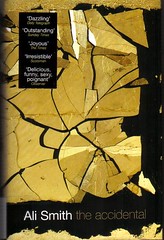"The Accidental" by Ali Smith
Sometimes bravery pays off. A while ago, I wrote of the trouble I had in getting into Hotel World but when Ali Smith's next book ws nominated for the Booker, I thought I'd try again. I'm so glad I did, although the end did turn out to be a bit of a fizzer.
The Smart family is a fairly typical one from a particular societal niche: Michael is an academic, a teacher of literature. He has had a succession of sexual encounters with various of his students: at one point he brags to himself that his wall is covered by postcards from such students. He is extremely tacky but, nonetheless, has managed to get himself into a relationship with Eve (yes, her first husband was Adam). She publishes books of imaginary interviews with dead people and is a great success. She has 2 kids. There is 12 year old Astrid, who obsessively films the dawning of every day after seeing love letters from her father to Eve in which the image of the sun coming up every day became a symbol of fidelity. She also films signs of societal decay - such as the racist insults painted onto the Indian restaurant. There's a cute scene when she videos a surveillance camera for her "local researches and archives", much to the discomfort of the security guard who tries to stop her. Astrid Smart lives up to her name - her mind is a continuous whirl of word play and strange connections. Teenaged Magnus is stranger and very withdrawn: he and his mates had taken the headshot of one of their female classmates and superimposed it on a naked body before sending it around their school. This caused the girl to kill herself.
They have come up to Norfolk on holiday. One day Amber just walks in to their lives: Eve thinks she is an unusually bold (and old, as she is in her 30's) example of the students she knows Michael is sleeping with. He thinks she is someone his wife is going to interview. Such is the gap between them that it takes several days for them to work out that no-one knows Amber - giving a nice irony to her proverbial "be careful not to let folk over your threshold till you're absolutely sure who they are". In the meantime, Michael has become completely besotted with her and Eve equally jealous and threatened. The reality is that Amber has bonded most closely with the kids: she spends hours wandering around with Astrid and, after saving Magnus from suicide, becomes everything his teenaged imagination might have imagined her to be in terms of a sexual partner. Poor Magnus: he's at dinner with the family and Amber is teasing him, causing him to blush at the memory of what they'd been up to and getting incredibly horny with it: his parents are all concerned that he's become sunburnt, which only makes things worse for him.
So, for the kids, Amber is very much a positive influence whereas for their parents, she becomes a catalyst for the inevitable split between them. All of this is played out during the middle section of the book, which culminates in Michael expressing himself in bad sonnets before his text fractures completely and Eve interviewing herself (but passing on the hard questions) before giving Amber her marching orders when she comes home to find Amber fondling her son.
The final section is a few months later: the Smart family gets home to find that their house has been stripped completely bare, right down to the doorknobs! The one thing left is the answering machine; it has some ominous messages which blow this already fragile family apart. There's a wonderful sequence in which Astrid is pondering her place in life at the beginning of the 21st century. She thinks of herself "hurtling through the air into it with a responsibility to heatseek all the disgustingness and the insanity, Asterid Smart the Smart Asteroid". But then:
Hurtling sounds like a little hurt being, like earthling, like something aliens from another planet would land on earth and call human beings who have been a little bit hurt.And Magnus is the hurtling - he is in real agony over his sense of responsibility for the death of his classmate, but has no-one to talk to; not, that is, until he finds his way to talking with his sister. I find myself crying again at the tenderness of that scene.
Take me to your leader, hurtling.
The really good thing about this book is the way Smith chose to tell it. She had a formal beginning, middle and an end - within each of which she gave each member of the family their own chapter, told from their point of view and using their own distinctive voice. The one thing that didn't really work for me was that we see Eve, in her last section, walking into a house where she is mis-recognised, first, as the hired help and, second, as some esteemed guest. I had the strongest feeling that she had randomly walked in, looking for news of her father, and fallen into the same sort of opportunity Amber had seized.



0 Comments:
Post a Comment
Subscribe to Post Comments [Atom]
<< Home